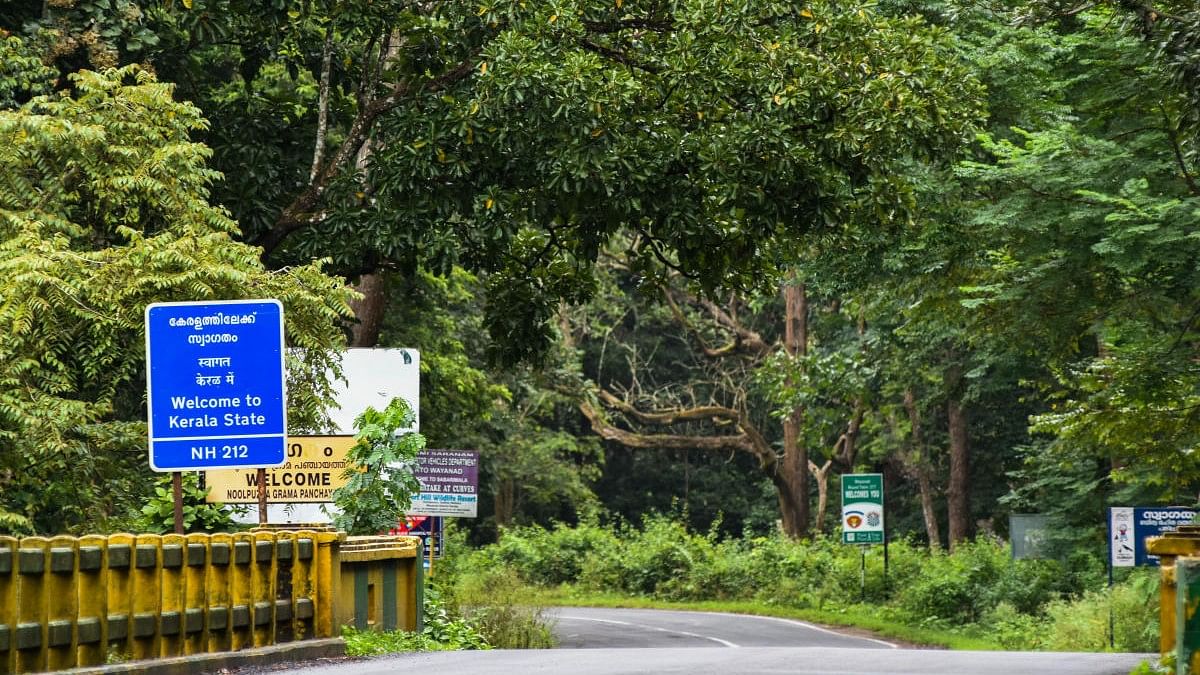
Kerala-Karnataka border inside Bandipur Tiger Reserve Forest on Mysuru-Calicut National Highway.
Credit: DH Photo
Karnataka’s Bandipur Tiger Reserve has become a focal point for two prominent issues: wildlife tourism and the nighttime closure of highways. The latter has turned into a political hot topic, particularly during elections in Kerala.
The matter awaits a final decision from the Supreme Court of India, but Kerala’s political leaders and vested interests frequently reignite the debate. While it is fair to raise concerns in a democracy, the authoritarian tone and spread of misinformation surrounding the issue are troubling.
In March 2010, the Karnataka High Court upheld nighttime highway closure to protect one of the nation’s most iconic tiger reserves. Karnataka made several accommodations, such as allowing emergency vehicles unrestricted passage during closure hours, extending closure time to 9 pm (compared to 6 pm in most other protected areas), and permitting 16 state-run transport buses during closure hours. During crises like Covid-19 and floods, Karnataka temporarily lifted all restrictions to allow unrestricted vehicular movement.
At Kerala’s request, an alternate route, only 35 km longer, was repaired at a cost of Rs 75 crore from Karnataka’s taxpayers. However, despite agreeing to this solution, Kerala has reneged on its promise and continues to use questionable tactics to push its agenda.
Numerous impleading applications (IAs) with identical demands are being filed by many individuals. One applicant claiming to represent the tourism industry reportedly has a record of forest offences, including encroachment, boundary tampering, and the electrocution of an elephant calf.
Since 2009, Kerala’s chief ministers have repeatedly pressed Karnataka to lift the closure, but Karnataka has remained resolute in the interest of wildlife conservation and in response to public demand.
Multiple committees established at Kerala’s request have consistently upheld the need for night closure. Notably, Tamil Nadu supports Karnataka’s stance and enforces a similar highway closure through the adjacent Mudumalai Tiger Reserve.
The issue resurfaced during the just-concluded Wayanad elections, as one of the candidates came from a family renowned for its dedication to wildlife conservation.
The late Prime Ministers Indira Gandhi and Rajiv Gandhi made pivotal contributions to rescuing India’s wildlife from the brink. In 1976, Indira Gandhi persuaded Maharashtra’s then Chief Minister S B Chavan to withdraw a proposal for a highway through Borivili National Park, advocating instead for alternative routes.
Despite opposition from many Members of Parliament, she ensured the passing of the Forest Conservation Act, 1980, through a presidential ordinance under Article 123(1) of the Constitution.
There are countless examples that highlight her unwavering commitment to nature and wildlife protection—one wonders if any political party today would take such bold steps for a cause that seems to have lost national urgency.
I hope the recent promises to lift the closure were just that—campaign rhetoric. One hopes that the legacy of those who championed conservation endures and inspires future generations to act responsibly.
The devastating July 2024 floods in Wayanad, which claimed hundreds of lives, should not be forgotten. All reports attributed these floods to the destruction of forests.
Despite alternative routes and multiple concessions, Kerala’s arguments remain unconvincing. The state’s slogan, “God’s Own Country,” rings hollow when it refuses to accommodate wildlife in Bandipur.
The resolution of this critical issue—and a much-needed reprieve for nature—rests with the Supreme Court. A judgement, now pending for 14 long years, could finally bring this matter to a logical conclusion.
Since the closure, no wildlife fatalities have occurred due to nighttime speeding. However, accidents during daytime hours or shortly before the 9 pm closure continue to claim lives, though these are relatively rare.
In December 2022, a female elephant was struck by a speeding truck at 8:30 pm. The injured elephant battled for her life for nearly an hour before succumbing to injuries.
The sorrow deepened the following morning when veterinarians conducting the post-mortem discovered she was pregnant—yet another life lost to reckless speeding.
That night, two lives—symbols of nature’s magnificence—were lost to human recklessness. This incident raises a pressing question: Are we truly committed to protecting our national heritage animal and the fragile ecosystem it inhabits?
(The writer is a wildlife conservationist)